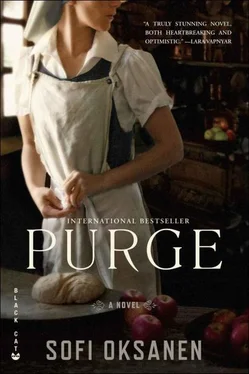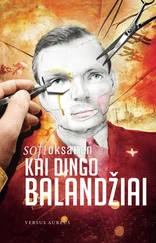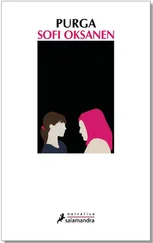She went to the bathroom and washed her hands. She put on her bra and underwear and stockings, tugged her dress back on, checked that the photo was still hidden in her bra and made sure the sedatives were still there, and went to the door to listen. She could hear the boss’s men playing cards, the video still running, nothing to suggest that they had noticed anything. They would see and hear everything before long-the boss had microphones and cameras. But they didn’t have permission to look when he had women with him.
She drank another glass of champagne from a Czech crystal glass and realized as she looked at the crystal flowers -they looked like cornflowers-that there had been glasses all around her all this time, tons of them-she could have swiped one of them quite a few days ago and slit her throat. She could have left much earlier, if she had really wanted to. Had she wanted to stay? Had she actually wanted to whore and sniff poppers? Had Pasha just directed her to the profession that suited her? Had she just been imagining that she wanted to leave, that everything was awful? Had she really liked it? Did she have a whore’s heart, a whore’s nature? Maybe it was a mistake to struggle against her whore’s fate-but it was no use thinking about it now.
She took a few packs of cigarettes and some matches and searched the boss’s pockets, but she didn’t find any money and there wasn’t time to make a more thorough search.
The apartment was on the top floor. She went down the shaky fire escape to the roof and from there to the other stairway to avoid the men with crew cuts who guarded the door. A smell of pee and a dark stairway downward. She stumbled on the chipped stone steps, thudded onto the landing and through the door, which was covered with artificial leather, its stuffing softening the sound. She could hear a child laughing inside and saying, “Babushka, Babushka.” When she reached the bottom she ran into a cat and a row of beat-up mailboxes. The outer door creaked and screeched. There was a well-waxed black car in front of it, shiny even in the darkness. A man sat inside it smoking, his leather coat shone dimly through the glass, and Russian disco music pounded. She didn’t look at the car as she went by, as if that could keep him from noticing her. But maybe it did, because the man just kept bobbing his head, absorbed in the music.
She stopped when she got to the end of the block. She felt clear. She was in tolerable condition if you didn’t count her ripped dress, the runs in her stockings, or the fact that she had no shoes. A woman racing down the street with no shoes might stick in a person’s mind, and she didn’t want to attract any attention. But she had to run. She couldn’t dawdle. A few broken yellow streetlights, a few people on their way home. The darkness hid their faces. The area was completely strange to her-maybe she had been here to see a customer, maybe not. The concrete looked the same everywhere. She ended up next to a main road. There was a bridge going over it. A bus went booming by with its accordion section shimmying, but even its headlights were so dim that no one would have taken note of her-and even if they had noticed, would anyone be interested, before Pasha had even started to ask questions, before fear and money made people remember things that they really didn’t remember? But you could always find somebody who would remember right. There’s no darkness so dark that someone can’t see in it.
The bus was followed by a Moskvitch sedan with one headlight out; then a Zhiguli clattered by, nothing but noise.
A bus stop emerged from the darkness so quickly that she didn’t have time to go around it or change directions, so she careened straight through the crowd waiting there, through the young mothers with their short skirts and white stockings, their delicate aroma a mixture of innocence and abortion, the girls’ red fingernails clawing at the darkness, at the future, in that familiar way. The flock scattered in bewilderment when she rushed in among them, the grannies with their dangling earrings, their withered earlobes swinging, and before the young men had time to put their arms around the girls protectively she was already out of the crowd, past the man drunk on eau de cologne, leaving behind the rustle of plastic bags, sailboats of happiness docked beside the girls, ready to carry them into their wonderful futures.
She went back in among the apartment houses. She couldn’t get on a lighted bus in her stocking feet. Someone might remember a breathless, shoeless woman. Someone would tell. She ran past the apartments, past the windows barred with beams of Stalin’s sunlight, past the barred balconies, the deserted, potholed streets, the jutting rebar and overflowing trash bins, the dumpling packets thrown on the ground, the shops. She stepped on a half-empty carton of kefir, kept running, ran past an old woman carrying onions in a net bag, past a children’s climbing cage and a sandbox that smelled like cats, past girls nestled like trash against the concrete with their heroin-battered skin and crusted mascara, past little boys and tubes of glue, the snuffle of snot and glue mixed together. She collided with a kiosk that was open and laughing, and stopped. Packs of cigarettes peaked out from the kiosk window, the flock of customers in front of the window were joking with the vendor. She changed direction-they hadn’t seen her yet-turned back, looked for a different route, left the flock of crew cuts behind her, standing with their legs thrust out, their buffalo necks, and ran past the murmur, the damp gasping that came from between the cement apartment blocks, away from the colossal high-rises, away from the cockroach slum, the scrape of needles, till she came to a large road. Where to now? Sweat ran down her neck, she could feel the Seppälä tag in her dress like a wet pillow through the thin fabric, the darkness roared around her, her sweat turned cold. Somewhere in Tallinn was a place called Taksopark, she remembered hearing about it, it was open day and night, that’s where the taxis went-but so what? What good did that do her? The first thing a taxi driver would do is ask questions. And she didn’t know how to drive a car, let alone steal one. Was there something else? A gas station, the kind where trucks stop? They had someplace to go, and she had someplace to go, some way that no one would notice, and quickly. Then suddenly there was a truck parked in front of her beside the road. It was running and there was no one in the cab-a dark green truck that blended into the landscape. She climbed into the truck bed, barely managed it. A moment later the driver came out of the bushes, his belt buckle clinked as he fastened it, and he climbed in and pulled onto the road.
She crawled in between the boxes.
She could barely even see herself in the light from the streetlamps. Then the lamps were gone, too. A fog was beginning to settle in. An empty GAI inspector’s booth flitted by. Little white sticks zipped by on the side of the road. Several BMWs whizzed past in a hail of macadam with their music pounding, but there wasn’t any traffic. The driver stopped once in the middle of desolate-looking countryside and hopped out. Zara peered out at the view. She could dimly make out the word Peoleo in the darkness. The driver came back belching and the trip continued.
Now and then the truck’s headlights brushed over rickety signs, but Zara couldn’t make out what they said. She pulled aside the tarp lining the truck bed far enough to peek out and see that there were no side mirrors, so she ventured to poke her head all the way out. The truck might be on its way anywhere. To Russia, maybe. It would be smartest to jump out if the truck was getting farther from Tallinn. The driver would probably stop somewhere to pee or get something to drink. And then what? She should look for a different ride. She could hitchhike. Cars headed away from Tallinn probably wouldn’t go straight back, and any car leaving Tallinn would at least be out of Pasha’s reach for a little while. Or was she being too optimistic? Pasha had ears everywhere, and Zara would be quite easy to identify. What if she succeeded in finding a car, but it was on its way out of Estonia?… But, if it was, it would have to cross the border at some point, and by the time it it did Pasha would have some sharp-eyed henchman there, on the lookout, asking questions. So it would be better to find a car going where she wanted to go, with a driver who was the kind of person that Pasha would never be able to find. What kind of person would that be? And who would give her a ride on a dark road in the middle of the night? No respectable person would even be out at that time of night, only thieves and businessmen like Pasha. Zara felt the secret pocket in her bra. The photo was still there-the photo and the name of the house and the village.
Читать дальше












